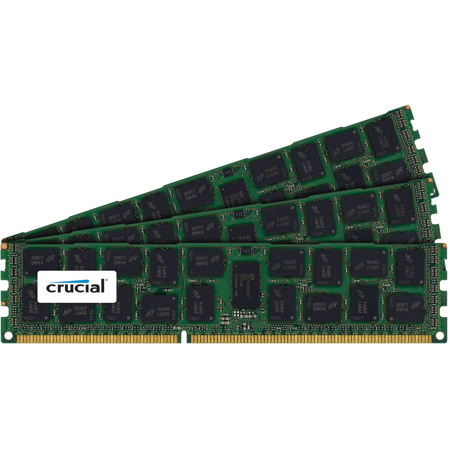


Review Summary
RDIMM
24GB (3x 8GB)
ECC
DDR3 PC3-12800
1600 MT/S
1.35V
11
3x 8GB
240-pin
Registered
1024Meg x 72
x8 based
Dual
649528759313
Increase the performance of your servers
Buying new servers is expensive. Getting more out of your current infrastructure isn't. Maximizing a server's installed memory capacity with high-density Crucial RDIMMs is one of the easiest and most affordable ways to make your deployments faster and more efficient. Crucial RDIMMs contain a register chip, which directs data commands and helps control the flow of data within the server. By virtue of the register chip, Crucial RDIMMs have ECC parity, which helps prevent data errors and increase overall system reliability.
Speed up server applications
By installing high-density Crucial RDIMMs, you'll be able to maximize the performance capability of your CPUs and make your servers faster. Since memory typically functions as a fixed (non-shared) component, it's often a bigger performance constraint than processors or storage drives, which can be shared. Maximize your investment in server infrastructure by maximizing memory capacity.
Get more out of your IT budget
At a fraction of the cost of new servers, Crucial RDIMMs allow you to extend the life and performance of your existing infrastructure and get more out of the rack space you already have. Even if you need to replace existing deployments, you can still save by buying servers with the least amount of preinstalled memory, then maximizing the installed memory capacity with Crucial RDIMMs.
Compatible with OEM servers and warranties
Similar to how you can upgrade a server's preinstalled components and choose whichever brands you want, you can do the same with memory without having to worry about voiding your manufacturer's warranty. In terms of system compatibility, Crucial RDIMMs are 100% component and module tested, validated by Intel and optimized for processors ranging from the Intel Xeon X5500 series to the latest Intel Xeon processor E5 2600 v3 product family.
Run more virtual machines and increase the responsiveness of virtualized applications
Since most of today's enterprise applications are stored on servers and distributed to a number of virtual machines, the amount of installed server memory plays a more critical role than ever before. Every virtual machine running on a server typically requires a dedicated amount of memory, meaning the more virtual machines you're running, the more memory you'll need.
Available in a range of speeds, densities and form factors
From legacy DDR modules to the latest DDR4 technology, Crucial RDIMMs are available in a range of configurations that include single, dual and quad ranked modules. Crucial RDIMMs are also available in the VLP form factor for improved airflow and cooling in space-constrained systems.
Backed by the Reliance Program
When you make an enterprise-level investment in Crucial products, they believe you deserve a higher level of support. The Reliance Program offers qualified customers up to four additional benefits that affirm Crucial Technology commitment to your servers through service call reimbursements, on-site spares, 24/7 technical support through their direct hotline and special bulk shipping options.
Micron quality - a higher level of reliability
As a brand of Micron, one of the largest memory manufacturers in the world, Crucial memory represents the future of workstation and server capability. From the original DDR technology to DDR4, Crucial Technology have engineered the memory technologies that have powered the world's systems for 35 years and counting. Designed for leading platforms, compatible with OEM systems and warranties and backed by a limited lifetime warranty, Crucial memory pushes the limits on performance.
Memory spec terms
If you're not sure if a module is right for your system, use the Crucial Memory Advisor tool for a list of guaranteed compatible modules.
NON-ECC/Non-parity
Most desktop and laptop computers take NON-ECC or Non-parity memory.
ECC/Parity
ECC or parity modules look for errors in data and are most often found in servers and other mission-critical applications used by large networks and businesses.
Unbuffered
Most PCs and workstations use unbuffered memory which is faster than registered memory.
Registered/Buffered
Registered or buffered modules delay all information transferred to the module by one clock cycle. This type of memory is primarily used in servers.
Fully buffered
Designed for next-generation servers, features an advanced memory buffer.
CL
CAS (column address strobe) latency, which is the number of clock cycles it takes before data starts to flow after a command is received. Lower CL is faster. Modules with different CL can be mixed on a system, but the system will only run at the highest (slowest) CL.
Component configuration
(For example: 64Meg x 64) Indicates the size of the memory chip components on the module.
Voltage
For example 2.6V. Indicates the power used by the module. The lower the better.